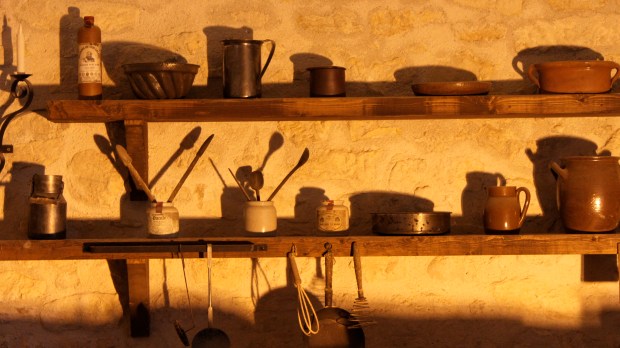ROME — God is always close to us, close to all our daily needs. He is even “moving about in the kitchen, among the pots and pans,” as the Virgin Mary shows us during her years in Nazareth, Fr. Ermes Ronchi told Pope Francis and members of the Roman Curia in the concluding meditation of their week-long Lenten retreat in the Roman hillside town of Ariccia.
It was “an ordinary day, in an ordinary place, with an ordinary girl” full of grace. Yet this “atmosphere of alarming normality” became the scene of a “colossal” event — the angel’s visit to Mary in Nazareth to announce the Incarnation.
“God is in the kitchen”
In his final reflection on the annunciation, the papal retreat master observed that it “occurred in everyday life, without witnesses, far from the lights and movement of the temple.”
“The Gospel’s first announcement of grace is given in the normality of a home,” in the one place, Fr. Ronchi said, where everyone is himself. It is there that “God comes upon you and touches you”:
“St. Teresa of Avila, in the ‘Book of Foundations’ Chapter 5, paragraphs 7 and 8, writes a letter to her nuns, in which we find these words: ‘Know, sisters, that God is moving about in the kitchen, among the pots and pans.’ But how is it that the Lord of the universe can be in the kitchen, moving about among the jugs, crockery, dishes, pots and pans (…) God is in the kitchen means bringing God into a place of proximity (…) If you don’t feel him at home, that is, in the simplest things, you haven’t yet found the God of life. You still remain at the level of the rational representation of the God of religion.”
Promise of happiness
The papal retreat master said we look to Mary precisely “to try to mend the most dramatic rift in our faith”: the “God of religion” that “has been separated from the God of life.” The woman of Nazareth, he continued, “as the lady of the house, presents us with an enormous challenge: to pass from a spirituality founded on the logic of the extraordinary, to a mysticism of daily life.” And in this experience of the everyday, the most prevalent feeling is joy: “Rejoice, Mary.” For when God draws near, “he brings a promise of happiness”:
“Mary reminds us, who are wrapped in weight and heaviness, wrapped in responsibility too that faith is either joyful trust or it’s not. (…) Mary enters the scene as a prophecy of happiness for our lives, as a hopeful, consoling blessing that descends on the pains of life, on the loneliness suffered, on the tenderness denied, on the violence that threatens us, but that will not overcome, because beauty is stronger than the dragon of violence, as the book of Revelation assures us. With this first expression, the angel says there is a happiness in believing, and a ‘pleasure’ in believing.”
God at work in our homes
Mary also “comes onto the scene as a woman who believes in love,” Fr. Ronchi said. “The angel was sent to a virgin betrothed to a man named Joseph.” According to the papal retreat master, in the Gospel of Luke, “the annunciation was made to Mary,” while in Matthew it was made to Joseph:
“But if we overlap the two Gospels, we see with joy that the announcement is made to the couple, the groom and the bride together, to the just man and the virgin who are in love. (…) God is at work in our relationships; he speaks within families, in our homes, in dialogue, amid the drama, in crisis, in doubt, in the outbursts. (…) God does not steal space from the family, he does not invade, he does not wound. He looks for a plural ‘yes,’ which is creative because it is the sum of two hearts, the sum of many dreams and so much patient work.”
Rock-solid faith, provided it’s authentic
Lastly, Mary knows how to make her questions known to God. She asks how what has been announced to her by the angel can be, given she does not know man. “Having doubts, asking questions is a way of standing before the Lord with all human dignity,” Fr. Ronchi said. “I accept the mystery, but at the same time I use all my intelligence. I tell God about my paths, and then I accept the paths above me”:
“Nowhere is it said that faith as solid as granite is better than smaller faith interwoven with questions. It just needs to be authentic (…), what is little has greater need of God. And in fact, what gives me hope is to see how, among the People of God, their questions increase. No one is satisfied anymore with the answers … with words already heard, with answers from the manual. They want to understand, go deeper, they want to make the faith their own. There was a time when everyone kept silent in front of the priest. Was it a time of greater faith? I believe the opposite is true, and if this is more work for us, it’s also an Alleluia, a ‘finally.’”
The papal preacher’s final thought was on divine maternity. “Without Mary’s body, the Gospel loses body,” Fr. Ronchi concluded. And all Christians “are called to me, mothers of God, since God always needs to come to the world.”
Read the 10 questions Pope Francis and the Roman Curia are contemplating during their Lenten retreat, here. Find the full week’s coverage of meditations under “Papal Retreat.”
Diane Montagnais Rome correspondent for Aleteia’s English edition.

